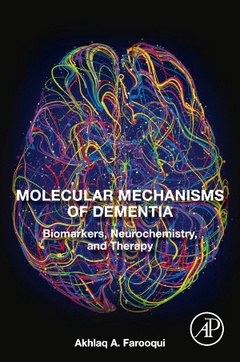Molecular Mechanisms of Dementia Biomarkers, Neurochemistry, and Therapy
Auteur : Farooqui Akhlaq A.

Considerable progress has been made in neurochemical and therapeutic aspects of dementia research in recent years. Molecular and Therapeutic Aspects of Dementia presents readers with comprehensive and cutting-edge information on the neurochemical mechanisms of various types of dementias. It provides a clearly written and logically organized and comprehensive overview of molecular aspects of risk factors, symptoms, pathogenesis, biomarkers, and therapeutic strategies for various types of dementia. This book is written for the international audience of neurochemists, neuroscientists, neurologists, neuropharmacologists, and clinicians. The hope is that this discussion will not only integrate and consolidate knowledge in this field, but will jumpstart more studies on molecular mechanisms and therapeutic aspects of dementia.
The comprehensive information in this monograph may not only help in early detection of various types of dementia and dementia linked neurological disorders, but also promote discovery of new drugs, which may block or delay the onset of dementia in elderly patients. Understanding the course of dementia is important not only for patients, caregivers, and health professionals, but also for health policy-makers, who have to plan for national resources needed in the management of an increasing number of dementia cases.
1. Neurochemical Aspects of Dementia2. Neurochemical aspects of post-stroke dementia3. Neurochemical Aspects of Alzheimer’s Type of Dementia4. Neurochemical aspects of Lewy body dementia5. Neurochemical aspects of vascular dementia6. Neurochemical aspects of frontotemporal dementia7. Potential treatment strategies for dementia with pharmacological and non-pharmacological interventions8. Potential treatment strategies for the treatment of dementia with Chinese medicinal plants9. Potential treatment strategies of dementia with Ayurvedic medicines10. Summary and perspective for future research on dementia
researchers, physicians, students in neuroscience, neurology, neurochemistry and neuropharmacology
- Provides a comprehensive overview of molecular aspects of risk factors, symptoms, pathogenesis, biomarkers, and therapeutic strategies for various types of dementia
- Summarizes cutting edge research information on signal transduction processes associated with neurochemistry of dementia
- Discusses the synthesis, metabolism, and role of lipid mediators in dementia
Date de parution : 04-2019
Ouvrage de 386 p.
15x22.8 cm
Thèmes de Molecular Mechanisms of Dementia :
Mots-clés :
Acetylcholine-esterase (AChE) inhibitors; Acupuncture; Aging; Alzheimer’s disease; And blood–brain barrier; And meditation; Ashwagandha; Ayurveda; BDNF; Behavioral changes; Behavioral problems; Brahmi; Cerebral blood flow; Cerebral small vessel disease; Chinese herbal medicine; Cognition; Cognitive function; Dementia; Dementia with Lewy bodies; Frontotemporal dementia; Ginkgo biloba; Ginseng; Gotu kola; Green tea; Guggul; Huperzine; Hypertension; Lacunar infarct; Memantine; NMDA receptor; Neurodegenerative diseases; Neurofibrillary tangles; Neurofilament; Neuroinflammation; Oxidative stress; Poststroke dementia; Psychological symptoms; Risk factors; Sankhapuspi; Senile plaques; Small-vessel disease; Stroke; Toxic gain of function; Transcranial magnetic stimulation; Vascular cognitive impairment; Vascular dementia; White matter hyperintensities; White matter injury; α-Synucleinopathies; α-synuclein; β-synuclein



